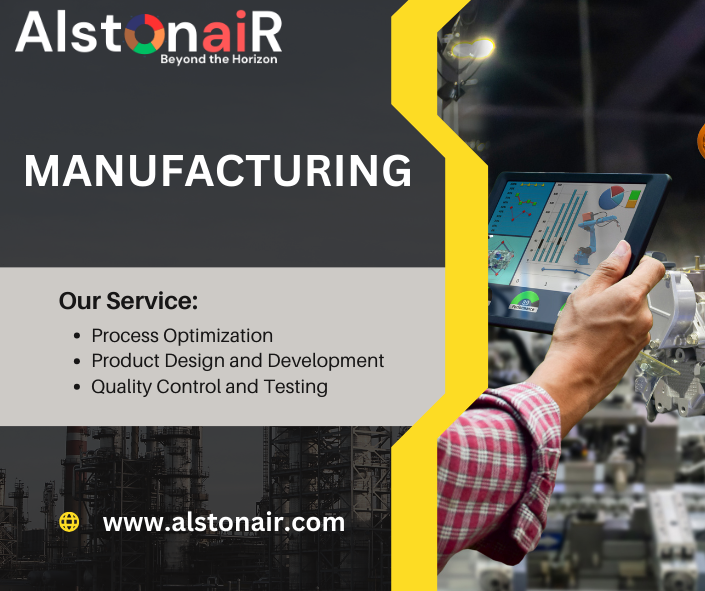At Alstonair Technologies, we harness the power of AI, software tools, and automation to solve key challenges in the manufacturing industry. As manufacturing evolves with Industry 4.0, businesses must adopt smart solutions to stay competitive, optimize production, and ensure sustainability.
1. Key Challenges in Manufacturing
Despite technological advancements, the manufacturing sector faces several persistent challenges:
- Efficiency & Productivity
Manufacturers struggle with unplanned downtimes, inefficient workflows, and excessive resource consumption. Optimizing production processes, reducing waste, and maintaining continuous operations are crucial for improving efficiency.
Global supply chains face disruptions due to unpredictable demand, logistics inefficiencies, and inventory mismanagement. AI-driven forecasting and real-time monitoring help mitigate these risks.
- Quality Control & Product Defects
Detecting defects manually is time-consuming and prone to errors. Ensuring product quality requires AI-powered visual inspection systems that provide real-time defect detection and precision analysis.
- Customization & Flexibility
Consumers now demand personalized and custom-built products, requiring manufacturers to shift from mass production to flexible manufacturing systems that allow mass customization without increasing costs.
- Sustainability & Energy Management
Rising energy costs and environmental regulations push manufacturers toward eco-friendly practices. AI can optimize energy usage and minimize carbon footprints through predictive energy management.
With automation replacing manual tasks, employees need training in AI, robotics, and digital systems. Upskilling programs and human-AI collaboration ensure a future-ready workforce.
2. AI and Software Solutions for Manufacturing Challenges
Modern manufacturing relies on AI-driven technologies to enhance efficiency, reduce costs, and improve quality control. Here’s how:
✔ AI-Powered Predictive Maintenance
- Solution: AI detects early signs of machine failure, preventing breakdowns before they occur.
- How It Works: AI analyzes sensor data from machinery to predict maintenance needs.
- Example: General Electric uses AI-driven predictive maintenance to extend equipment life and reduce downtime.
✔ Automation & Robotics in Manufacturing
- Solution: AI-driven robotic process automation (RPA) performs repetitive and precise tasks efficiently.
- How It Works: Robots equipped with AI algorithms improve assembly, welding, and packaging operations.
- Example: Tesla uses AI-powered robots in assembly lines to manufacture vehicles with minimal human intervention.
✔ AI-Optimized Supply Chain Management
- Solution: AI enhances supply chain efficiency by optimizing inventory, logistics, and demand forecasting.
- How It Works: Machine learning algorithms predict supply chain disruptions and optimize warehouse operations.
- Example: Walmart uses AI-powered demand forecasting to optimize inventory and reduce waste.
✔ AI-Based Quality Control & Defect Detection
- Solution: AI-powered visual inspection tools detect product defects in real time, improving quality control.
- How It Works: AI analyzes images from production lines, flagging defects with greater accuracy than human inspectors.
- Example: Siemens utilizes AI-driven computer vision to detect minute defects in manufacturing.
✔ Digital Twin Technology
- Solution: Digital twins create a virtual simulation of production processes to predict and prevent inefficiencies.
- How It Works: AI mirrors real-world machinery in a digital model, allowing manufacturers to test changes before implementing them.
- Example: Boeing uses digital twins to optimize aircraft manufacturing, improving efficiency and reducing costs.
3. Future Trends in Manufacturing
The future of manufacturing is shaped by rapid technological advancements and increasing customer expectations. Here are the key trends:
- Industry 4.0 & Smart Factories
- Trend: Factories are becoming fully connected ecosystems, integrating AI, IoT, and automation.
- Technology Used: Industrial IoT (IIoT), AI-driven automation, cloud computing, real-time data analytics.
- Impact: Improves production efficiency, decision-making, and reduces operational costs.
- Example: Siemens’ Amberg plant is a fully automated smart factory that optimizes production in real time.
- 3D Printing & Additive Manufacturing
- Trend: Manufacturers are using 3D printing for rapid prototyping and on-demand production.
- Technology Used: AI-powered additive manufacturing, lightweight materials, generative design.
- Impact: Reduces production costs, shortens lead times, and enables mass customization.
- Example: General Electric produces 3D-printed jet engine components, reducing weight and increasing durability.
- Sustainable & Green Manufacturing
- Trend: Companies are prioritizing energy efficiency, waste reduction, and eco-friendly materials.
- Technology Used: AI-driven energy monitoring, circular manufacturing, sustainable supply chains.
- Impact: Reduces carbon footprint, improves corporate responsibility, and lowers energy costs.
- Example: Coca-Cola uses AI-based energy management systems to cut down power consumption.
- Collaborative Robots (Cobots)
- Trend: AI-powered cobots work alongside humans to enhance productivity and safety.
- Technology Used: Machine learning, IoT sensors, real-time decision-making algorithms.
- Impact: Improves efficiency, reduces workplace injuries, and enables human-AI collaboration.
- Example: Universal Robots’ cobots assist with assembly and packaging in automotive and electronics manufacturing.
- Edge Computing & Real-Time Data Processing
- Trend: AI-driven edge computing processes manufacturing data in real-time, reducing latency and improving automation.
- Technology Used: Edge AI, IoT, real-time monitoring, decentralized cloud computing.
- Impact: Faster data processing, reduced operational downtime, and better production insights.
- Example: Bosch uses edge computing to improve real-time performance in manufacturing operations.
Why Choose Alstonair Technologies?
At Alstonair Technologies, we empower manufacturers with AI-driven innovation, automation, and data intelligence. Our solutions ensure:
- Optimized efficiency & reduced costs through predictive maintenance.
- Improved product quality with AI-powered defect detection.
- Streamlined supply chains through AI-driven logistics and demand forecasting.
- Sustainable manufacturing practices that align with global green initiatives.
- Future-ready workforce solutions to train employees in AI and automation.
Stay ahead in the manufacturing revolution.
Adopt AI, automation, and Industry 4.0 with Alstonair Technologies.
Contact us today to explore smart manufacturing solutions!ologies will gain a competitive edge, improve product quality, and reduce costs while becoming more responsive to market demands.
